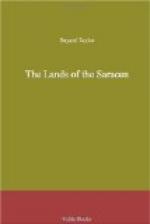There were half a dozen men and boys about the door, amusing themselves with bursting percussion caps on the stone. They addressed us as “hadji!” (pilgrims), begging for more caps. I told them I was not a Turk, but an Arab, which they believed at once, and requested me to enter the mosque. The interior had a remarkably fine effect. It was a maze of arches, supported by columns of polished black marble, forty in number. In form it was nearly square, and covered with a flat, wooden roof. The floor was covered with a carpet, whereon several persons were lying at full length, while an old man, seated in one of the most remote corners, was reading in a loud, solemn voice. It is a peculiar structure, which I should be glad to examine more in detail.
Not far from this eminence is a remarkable leaning minaret, more than a hundred feet in height, while in diameter it cannot be more than fifteen feet. In design it is light and elegant, and the effect is not injured by its deviation from the perpendicular, which I should judge to be about six feet. From the mosque we walked over the mounds of old Iconium to the eastern wall, passing another mosque, wholly in ruin, but which must have once been more splendid than any now standing. The portal is the richest specimen of Saracenic sculpture I have ever seen: a very labyrinth of intricate ornaments. The artist must have seen the great portal of the Temple of the Sun at Baalbec. The minarets have tumbled down, the roof has fallen in, but the walls are still covered with white and blue tiles, of the finest workmanship, resembling a mosaic of ivory and lapis lazuli. Some of the chambers seem to be inhabited, for two old men with white beards lay in the shade, and were not a little startled by our sudden appearance.
We returned to the great mosque, which we had visited on the evening of our arrival, and listened for some time to the voice of a mollah who was preaching an afternoon sermon to a small and hungry congregation. We then entered the court before the tomb of Hazret Mevlana. It was apparently forbidden ground to Christians, but as the Dervishes did not seem to suspect us we walked about boldly, and were about to enter, when an indiscretion of my companion frustrated our plans. Forgetting his assumed character, he went to the fountain and drank, although it was no later than the asser, or afternoon prayer. The Dervishes were shocked and scandalized by this violation of the fast, in the very court-yard of their holiest mosque, and we judged it best to retire by degrees. We sent this morning to request an interview with the Pasha, but he had gone to pass the day in a country palace, about three hours distant. It is a still, hot, bright afternoon, and the silence of the famished populace disposes us to repose. Our view is bounded by the mud walls of the khan, and I already long for the freedom of the great Karamanian Plain. Here, in the heart of Asia Minor, all life seems to stagnate. There is sleep everywhere, and I feel that a wide barrier separates me from the living world.




